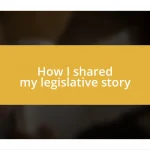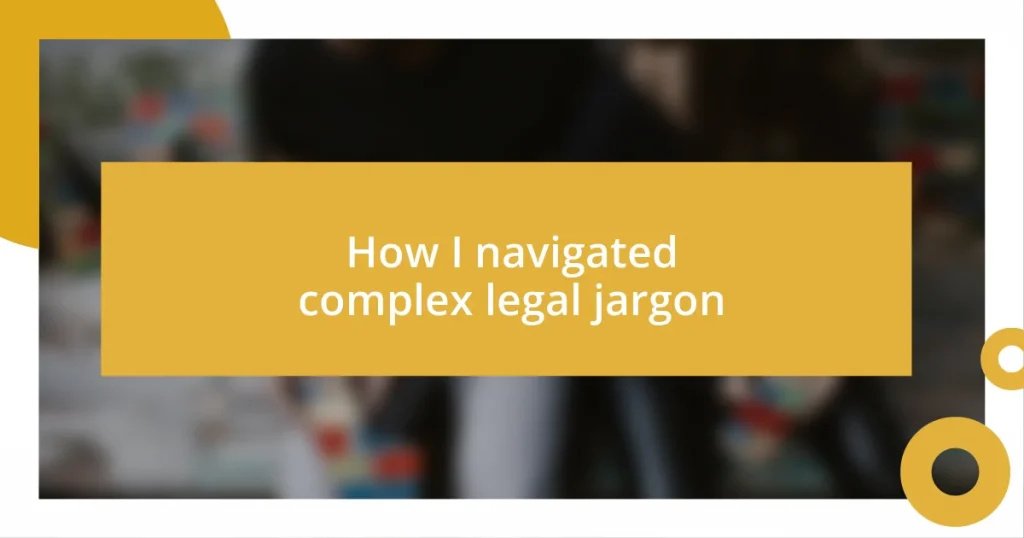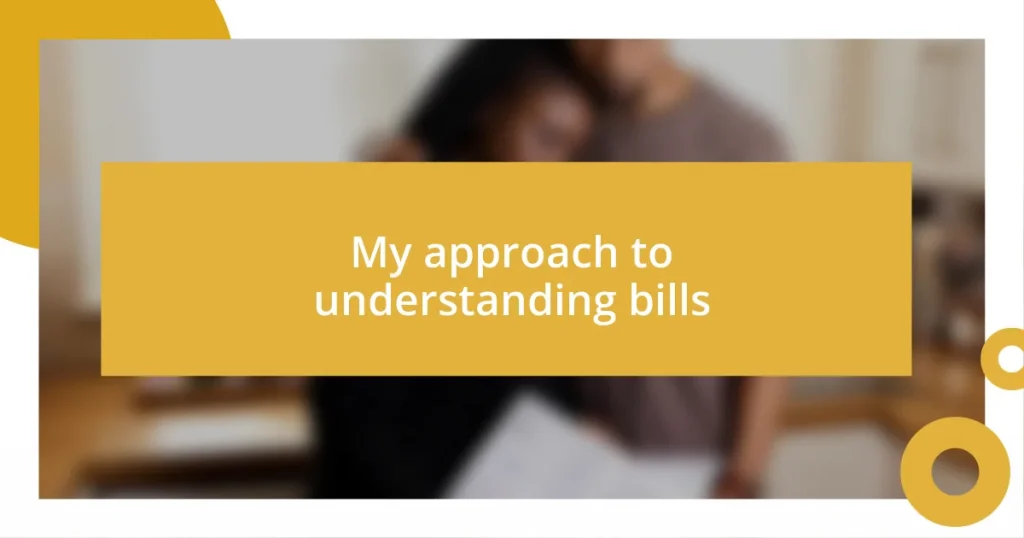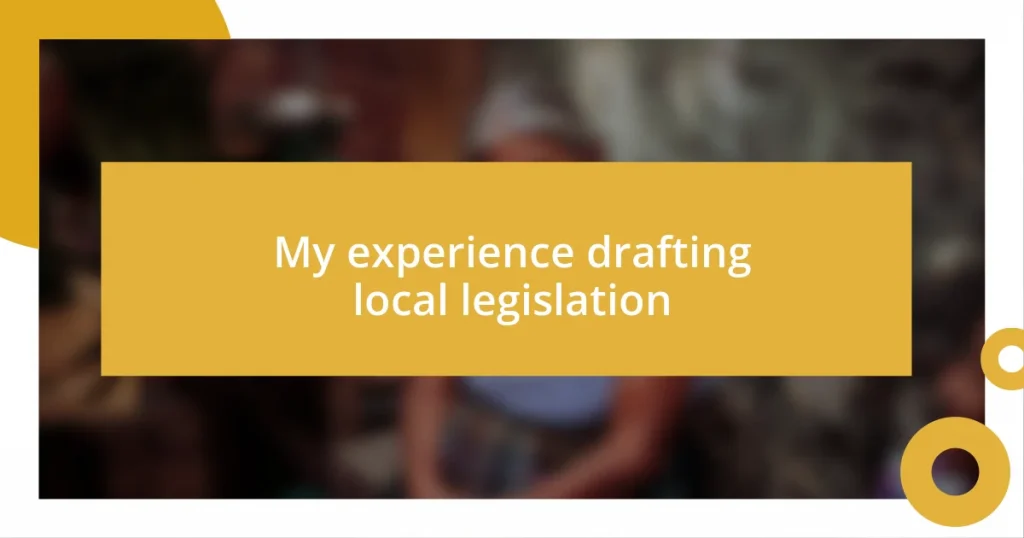Key takeaways:
- Understanding and simplifying complex legal jargon can empower individuals to engage more effectively in legal discussions.
- Utilizing resources like online dictionaries, forums, and videos enhances comprehension and makes legal concepts more relatable.
- Seeking professional help and consistently reviewing legal material builds legal literacy over time, turning confusion into clarity.
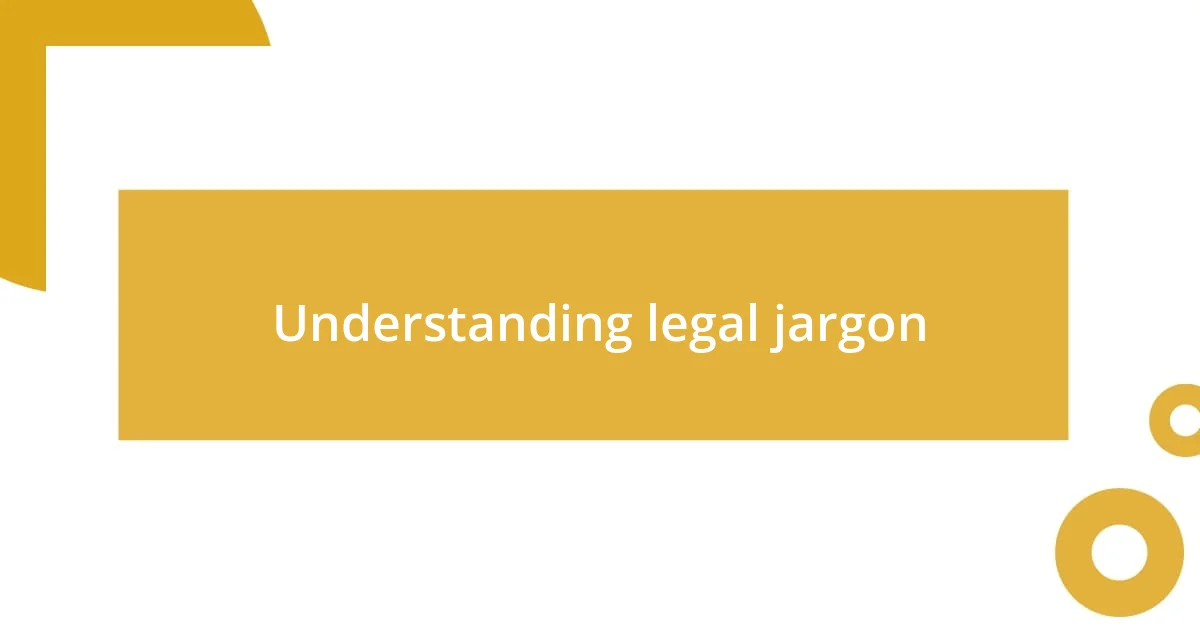
Understanding legal jargon
Understanding legal jargon can feel like trying to decipher a foreign language. I remember sitting in a lawyer’s office, overwhelmed by terms like “heretofore” and “indemnity.” I couldn’t help but wonder: why did they choose such complex words instead of plain English? This experience made me realize how crucial it is for us to unravel this intricate language.
As I delved deeper into various legal documents, I began to see patterns in the terminology. With time, I learned that many legal terms have Latin roots, which can explain their length and complexity. For instance, “subpoena” comes from the Latin term meaning “under penalty.” This actually made me appreciate the precision these terms bring to legal discussions, albeit at the cost of accessibility.
I often found myself keeping a glossary close by during legal meetings, not just to understand but to engage. It was empowering to break down terms into simpler concepts, and I even started sharing these simplifications with friends. Have you ever found a more accessible way to explain something complicated? It felt so rewarding to transform that legal jargon into something relatable, fostering better conversations around important matters.
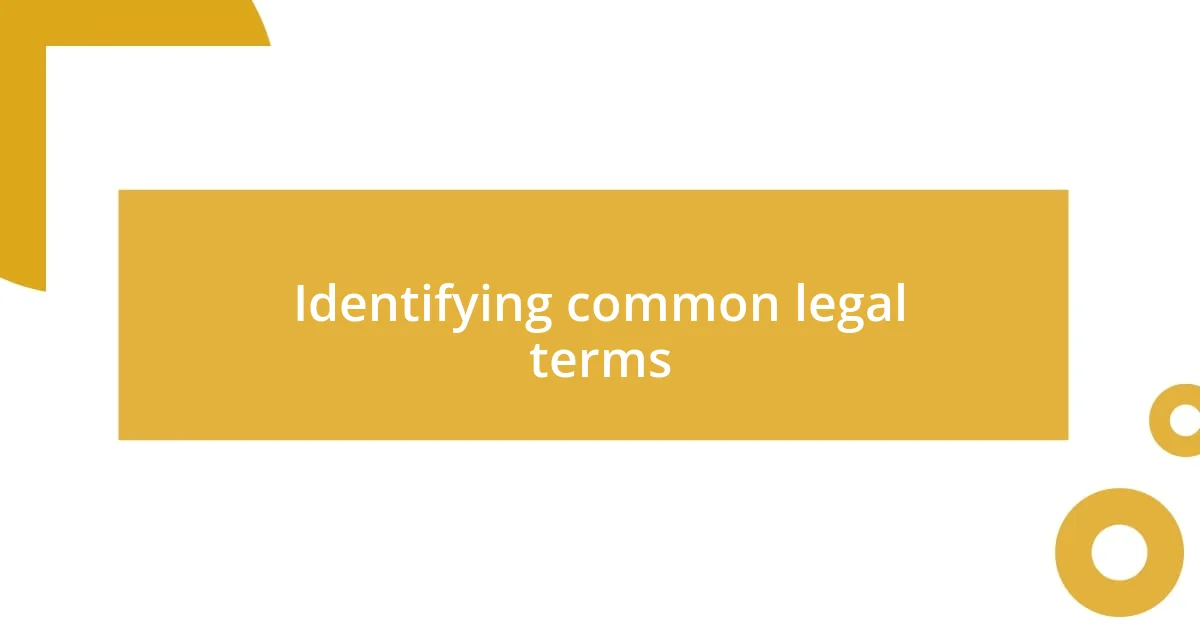
Identifying common legal terms
As I ventured deeper into the legal labyrinth, I discovered that certain terms popped up repeatedly, often leading to confusion. Take “plaintiff” and “defendant,” for example. Initially, trying to remember which was which felt like a mental exercise in futility, but I later found it was easier when I associated “plaintiff” with “presentation”—the person presenting the case. This simple trick changed my approach to reading legal documents entirely.
In my journey, I also learned that while some terms are unique to specific legal areas, many are universally recognized—like “contract” and “tort.” These terms often represent concepts that are surprisingly straightforward once you break them down. Personally, I remember how thrilling it was to identify “tort” as simply a wrongful act that leads to legal liability. It was as though I had unlocked a secret code that made legal texts less intimidating.
Here’s a handy table that outlines some common legal terms along with their meanings and synonyms:
| Legal Term | Meaning/Synonym |
|---|---|
| Plaintiff | Person bringing a lawsuit (complainant) |
| Defendant | Person being accused or sued (respondent) |
| Contract | Legally binding agreement (deal) |
| Tort | Wrongful act leading to legal liability (wrongdoing) |
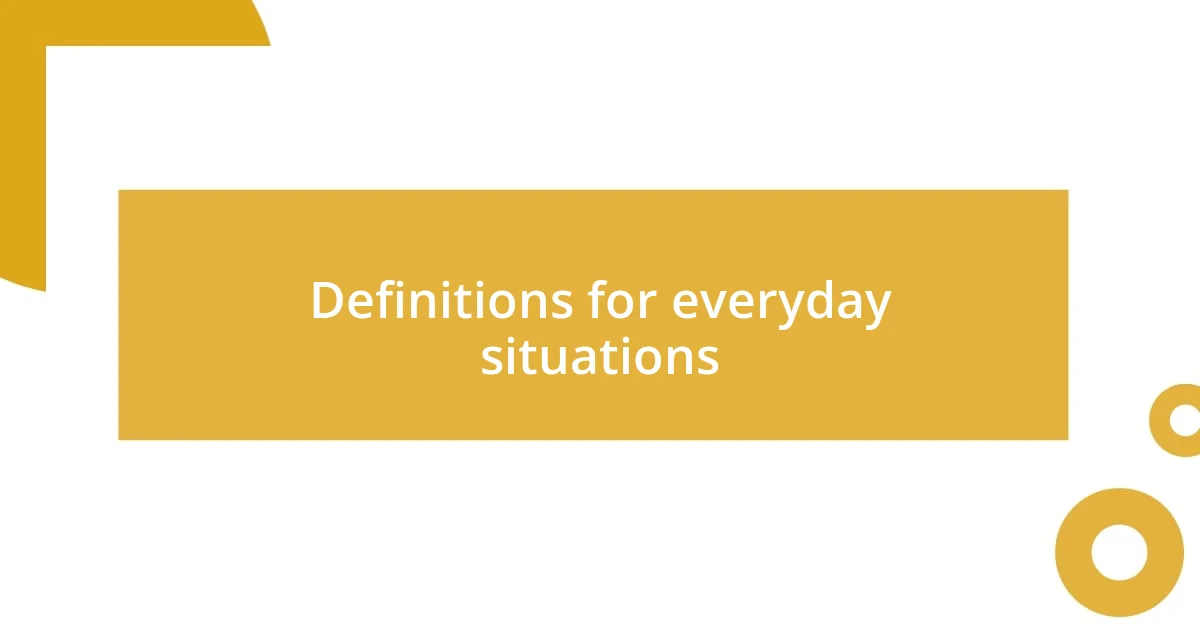
Definitions for everyday situations
I often found that breaking down complex legal terms into everyday language made a huge difference in my understanding. For instance, when I first encountered “foreclosure,” I immediately pictured a house being taken away. It turned out that foreclosure is really when a lender repossesses property because the borrower failed to meet the loan terms. That simple definition resonated with me because it emphasized the human side of the legal process; it’s not just about contracts, but about people’s homes and lives.
Here’s a list of some common legal terms with relatable definitions:
- Power of Attorney: This is the authority to act on someone else’s behalf, like when my sister gave me the power to handle her finances while she was abroad. It felt empowering to be entrusted with that responsibility.
- Liability: This refers to being legally responsible for something, such as if someone slips on your sidewalk. I learned that taking care of your property isn’t just about pride; it’s about being proactive to avoid future issues.
- Due Diligence: This means doing necessary research before entering into an agreement. I remember feeling relieved I researched my car’s history thoroughly before buying it. It equipped me to make an informed decision.
Understanding these terms helped me feel more in control during legal discussions, turning stress into clarity. It was almost like uncovering layers of a puzzle, where each piece brought me closer to grasping the complete picture.
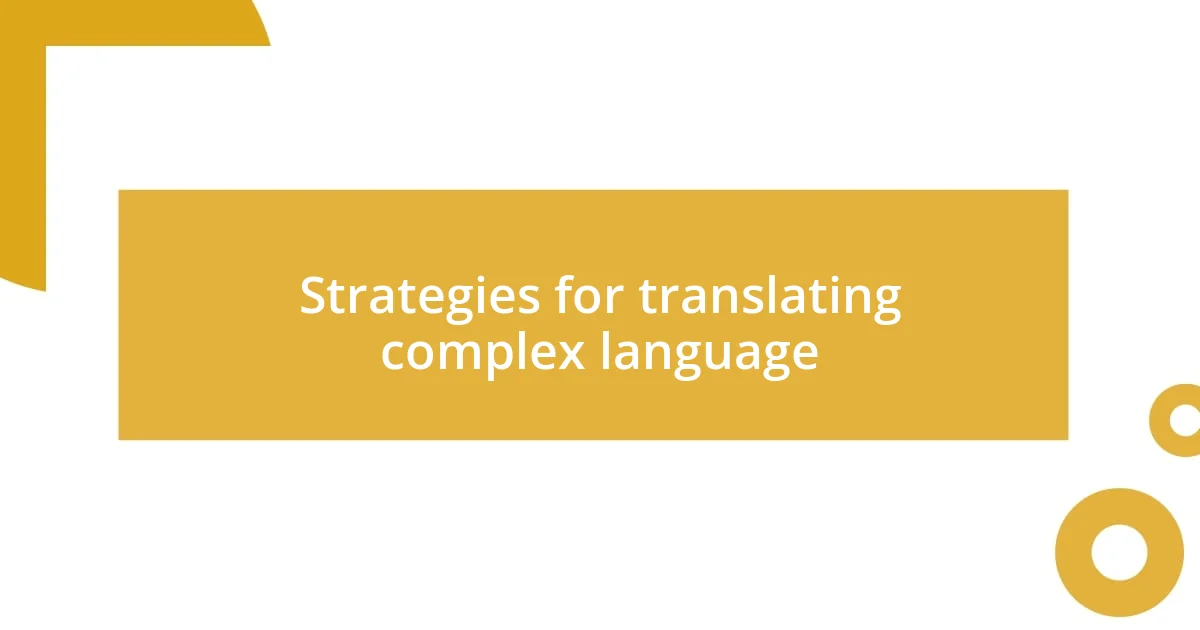
Strategies for translating complex language
One effective strategy I relied on was contextualization. I found that placing complex legal terms within a real-life framework made them far more digestible. For example, when I first encountered the term “breach of contract,” I imagined it as a business partner forgetting to deliver their end of a deal. This visualization not only clarified the meaning but also made it relevant to my own experiences in managing joint ventures. Have you ever felt overwhelmed by an agreement? Associating legal jargon with your personal experiences can turn abstract terms into tangible concepts.
Another technique I adopted was breaking information down into bite-sized pieces. When faced with lengthy clauses filled with legal jargon, I learned to tackle them one sentence at a time. For instance, when reviewing a lease agreement, I would summarize each paragraph in my own words. This approach made it feel like I was having a one-on-one conversation with the document rather than trying to decipher a foreign language. It was empowering; I could affirm my understanding with each small victory, transforming frustration into confidence.
Lastly, I discovered the power of asking questions—whether to myself or to a knowledgeable friend. When I didn’t understand a term or a concept, I used to internalize my confusion. Over time, I began to verbalize my uncertainties, asking for clarification. I vividly remember a moment when I asked a friend about “indemnification.” That simple request for explanation led to a deeper discussion that really opened my eyes. Suddenly, I was not just learning; I was engaging in dialogue about the very essence of legal concepts, and it felt incredibly enriching. Wouldn’t you agree that articulating questions is a vital step in understanding?
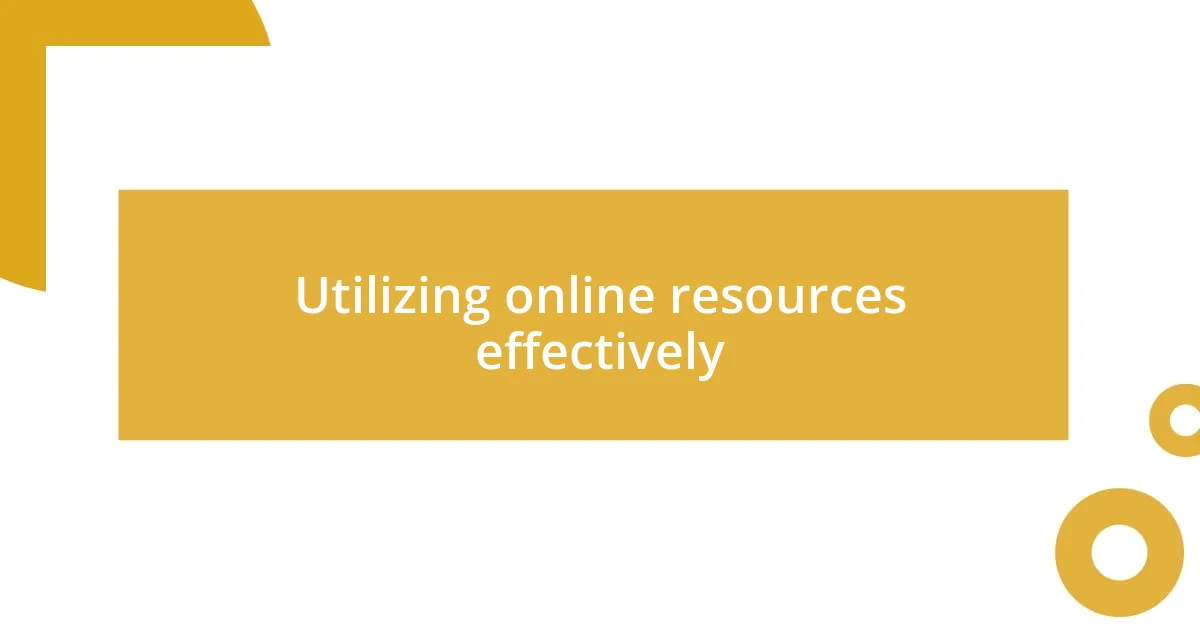
Utilizing online resources effectively
Utilizing online resources effectively has been a game-changer in simplifying legal jargon for me. I vividly recall how deconstructing legal nuances through online legal dictionaries helped clarify my confusion. When I stumbled across terms like “arbitration,” I found great relief in reading clear, concise definitions that demystified the concept. It’s incredible how a simple search can turn complex legal concepts into understandable terminology, making the whole process feel less daunting.
I also took advantage of forums and discussion boards focused on legal topics. It was refreshing to see how others navigated similar challenges and to gain insights from their questions and experiences. I remember reading a post where someone shared their interpretation of “breach of fiduciary duty.” Their explanation, rooted in a real-life scenario, made the term resonate with me. Have you ever felt alone tackling legal matters? Connecting with a community can provide not just knowledge, but also a sense of solidarity that you are not navigating this world alone.
Moreover, video resources turned out to be invaluable in my journey. Watching experts break down complex legal topics into digestible videos was not only engaging but also aided my retention. I remember one particular video that illustrated the concept of “negligence” with real-life examples. It dramatically shifted my understanding from textbook definitions to practical implications. Isn’t it amazing how diverse online resources can enhance our comprehension?
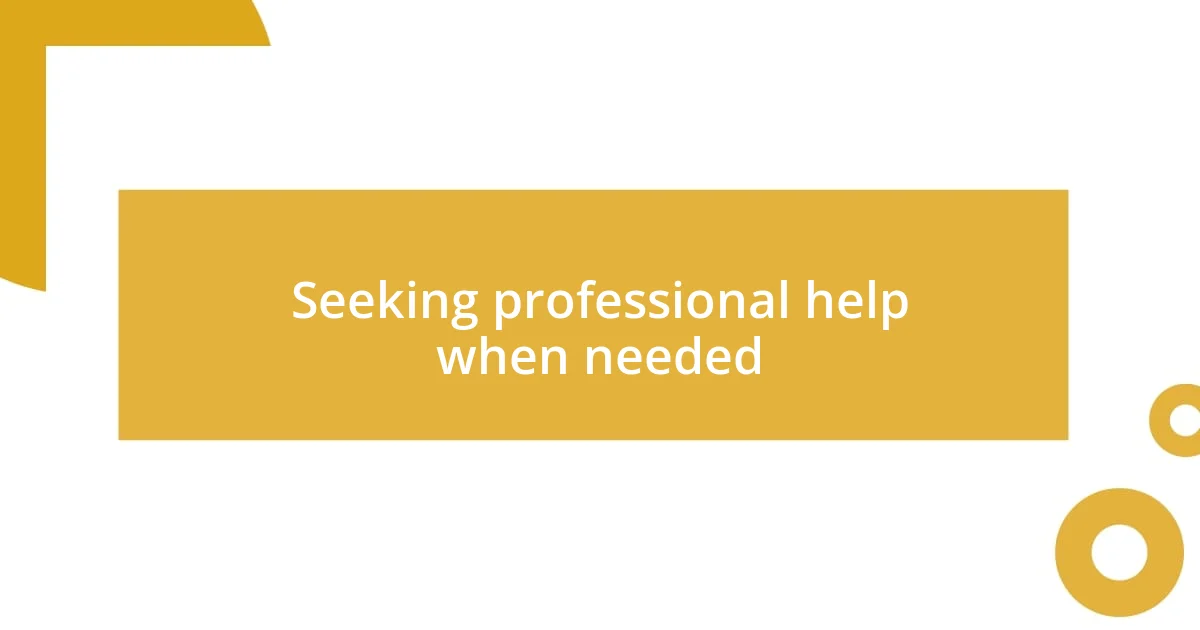
Seeking professional help when needed
There were times when navigating the sea of legal jargon became overwhelming, and I realized the importance of seeking professional help. I clearly remember the day I was trying to understand the terms of a complicated contract. It felt like I was reading a foreign language. Instead of struggling through it alone, I decided to consult a lawyer. That simple choice brought clarity and peace of mind—it was as if a weight had been lifted off my shoulders. Have you ever considered how professional guidance could turn a daunting task into a manageable one?
Investing in a legal expert can also save you time and prevent costly mistakes. I recall working on a real estate deal where I was tempted to cut corners and interpret the documents myself. But after a few false starts, I recognized the potential pitfalls I was facing. Engaging a knowledgeable attorney made all the difference; they highlighted nuances I’d overlooked and provided insights that saved me from making hasty decisions. If I had opted to go it alone, I might have found myself in a precarious situation. Doesn’t it make sense to leverage professional expertise when the stakes are high?
Sometimes, it’s easy to underestimate the emotional toll that dealing with complex legal language can take. I’ve felt the anxiety rise when wrestling with pages of fine print, fearing I might miss something critical. Seeking help from professionals not only eased my confusion but also reassured me that I wasn’t facing these challenges in isolation. The moment I asked a trusted attorney for support, I felt empowered and more in control of my situation. Have you ever noticed how sharing your concerns can transform not just your understanding but also your confidence?
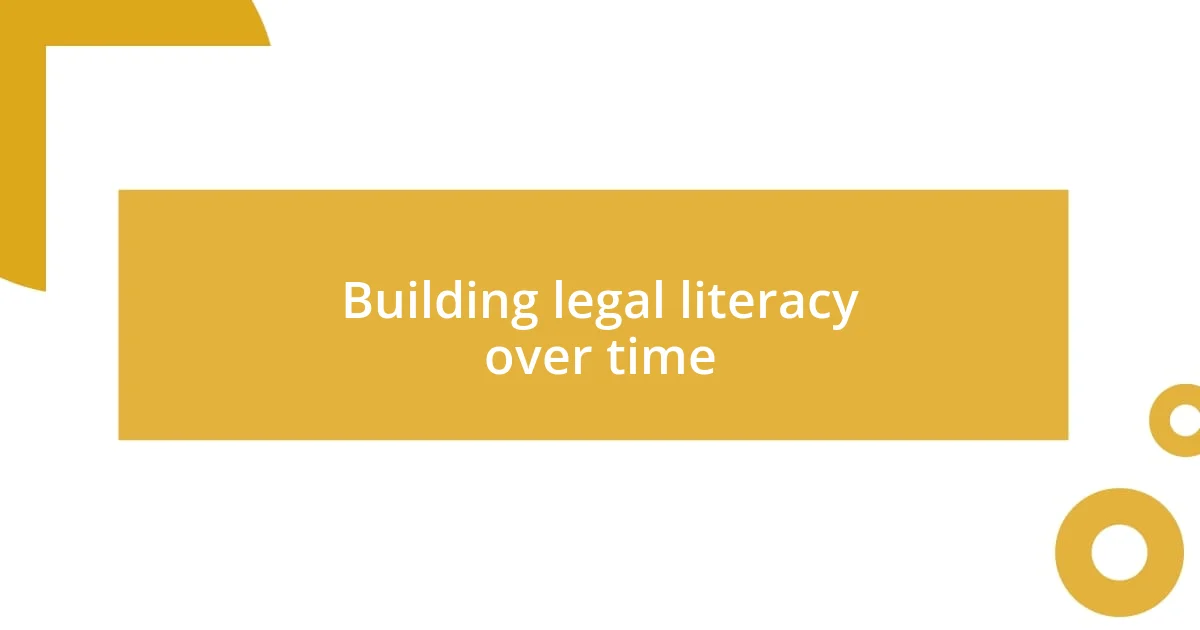
Building legal literacy over time
Building legal literacy doesn’t happen overnight; it’s more of a gradual, enriching journey. I remember the early days when legal terms felt like a foreign language, leaving me frustrated and confused. However, over time, consistently engaging with legal content transformed that confusion into clarity. Have you ever had that moment when something finally clicks? For me, it often happened during late-night reading sessions when the fog would lift, and I could see the connections in the language much more clearly.
As I immersed myself in various legal documents and resources, I discovered the significance of repetition. Repeated exposure to specific legal terms helped solidify my understanding. I recall tackling a lease agreement for the first time; the more I reviewed the clauses, the more familiar they became. It was akin to learning a new language—at first, it felt overwhelming, but repeated practice sharpened my skills. Isn’t it remarkable how persistence can pave the way for expertise?
Engaging with real-world examples also played a crucial role in my learning process. I started looking at case studies and news articles that featured legal implications, and this not only sparked my interest but grounded my understanding. I vividly remember reading about a high-profile court case, which helped me grasp the concept of “precedent.” Suddenly, the term became more than just an abstract idea; it became a vital part of understanding the law in action. Have you considered how connecting theory with real-life scenarios can boost your legal literacy? It truly enriched my journey, making the legal realm feel less intimidating and more accessible.



